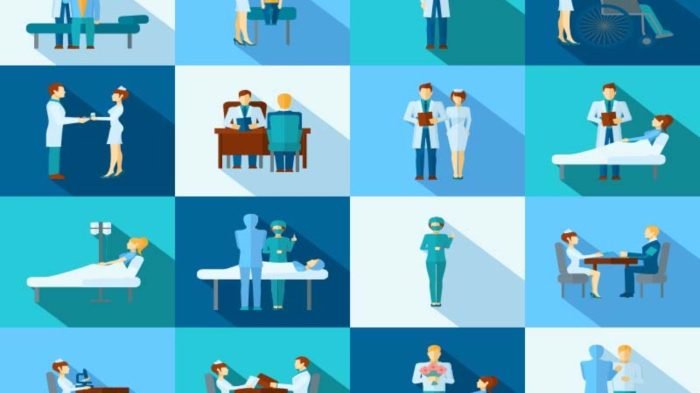Health science careers set the stage for a journey that intertwines scientific knowledge with the profound impact of improving human lives. From the bustling hospital corridors to the quiet confines of research labs, health science professionals are at the forefront of a dynamic field, constantly striving to advance medical knowledge and improve patient outcomes.
The field of health science encompasses a vast array of disciplines, each contributing to the overall well-being of individuals and communities. Whether it’s the meticulous work of a nurse, the groundbreaking discoveries of a biomedical researcher, or the dedication of a public health professional, every health science career plays a vital role in shaping the future of healthcare.
The Scope of Health Science Careers

Health science encompasses a vast and dynamic field that plays a pivotal role in promoting human well-being and improving the quality of life. It encompasses a diverse array of specializations and roles, each contributing to the advancement of healthcare and the betterment of society.
Health Science Career Paths
The health science field offers a wide range of career paths, catering to diverse interests and skill sets. Each specialization requires specific educational qualifications and involves unique job duties.
| Career Path | Educational Requirements | Job Duties | Potential Salary Range |
|---|---|---|---|
| Registered Nurse (RN) | Associate’s Degree in Nursing (ADN) or Bachelor of Science in Nursing (BSN) | Provide direct patient care, administer medications, educate patients and families, collaborate with other healthcare professionals | $60,000
|
| Physician Assistant (PA) | Master’s Degree in Physician Assistant Studies | Provide comprehensive medical care under the supervision of a physician, diagnose and treat illnesses, order and interpret tests | $100,000
|
| Medical Technologist | Bachelor’s Degree in Medical Technology | Perform laboratory tests, analyze blood and tissue samples, provide accurate and timely results for diagnosis and treatment | $50,000
|
| Pharmacist | Doctor of Pharmacy (PharmD) | Dispense medications, counsel patients on drug interactions and side effects, monitor patient outcomes, research and develop new drugs | $120,000
|
| Physical Therapist (PT) | Doctor of Physical Therapy (DPT) | Develop and implement treatment plans for patients with musculoskeletal injuries, neurological disorders, and other conditions, promote rehabilitation and recovery | $80,000
|
| Occupational Therapist (OT) | Master’s Degree in Occupational Therapy | Help patients develop skills and strategies to participate in daily activities, improve their functional independence, and adapt to their environment | $70,000
|
| Radiologic Technologist | Associate’s Degree in Radiologic Technology | Operate imaging equipment, such as X-ray machines and CT scanners, produce high-quality images for diagnosis and treatment | $55,000
|
| Dietitian | Bachelor’s Degree in Nutrition or Dietetics | Provide nutritional counseling to individuals and groups, assess dietary needs, develop meal plans, and promote healthy eating habits | $50,000
|
Impact of Health Science Careers on Society
Health science careers play a vital role in safeguarding public health and well-being. These professionals contribute to disease prevention, treatment, and management, promoting healthier lifestyles and improving the overall quality of life.
“Health science professionals are the backbone of our healthcare system, dedicated to improving the lives of others.”
Key Areas of Health Science

Health science encompasses a vast and diverse range of disciplines that contribute to the well-being of individuals and communities. From diagnosing and treating illnesses to promoting public health and conducting groundbreaking research, these fields work collaboratively to advance healthcare. This section explores the key areas of health science, highlighting their unique contributions and the skills and knowledge required for success in each area.
Medicine
Medicine is the core of healthcare, focusing on the diagnosis, treatment, and prevention of diseases. Physicians, the primary practitioners in this field, possess a deep understanding of human anatomy, physiology, and pathology.
- Skills and Knowledge:Physicians must be adept at clinical examination, interpreting diagnostic tests, and formulating treatment plans. They also need strong communication skills to interact with patients, families, and other healthcare professionals.
- Educational Pathways:Aspiring physicians must complete a four-year undergraduate degree followed by four years of medical school, culminating in the Doctor of Medicine (MD) or Doctor of Osteopathic Medicine (DO) degree. This is followed by a residency program, specializing in a particular area of medicine, such as internal medicine, surgery, or pediatrics.
- Career Opportunities:Medicine offers a wide range of career paths, including general practitioners, specialists, researchers, educators, and administrators.
- Salary Range:Physician salaries vary based on specialty, experience, and location, but generally range from $200,000 to $500,000 annually.
Nursing
Nursing plays a vital role in providing direct patient care, encompassing a wide range of activities from administering medications and monitoring vital signs to educating patients and families about their health conditions. Nurses are the primary point of contact for patients in hospitals, clinics, and other healthcare settings.
- Skills and Knowledge:Nurses need strong clinical skills, including assessment, medication administration, and wound care. They must also possess excellent communication, interpersonal, and critical thinking skills to provide compassionate and effective patient care.
- Educational Pathways:Nursing education typically involves a two-year associate’s degree, a four-year bachelor’s degree, or a master’s degree. Registered Nurses (RNs) must pass the National Council Licensure Examination (NCLEX-RN) to practice.
- Career Opportunities:Nurses work in a variety of settings, including hospitals, clinics, schools, and private practices. They can specialize in areas such as critical care, oncology, pediatrics, and geriatrics.
- Salary Range:The average salary for a Registered Nurse (RN) is around $75,000 per year, with higher salaries for specialized nurses and those working in high-demand areas.
Public Health
Public health focuses on improving the health of populations through prevention and health promotion initiatives. Public health professionals work to identify and address health risks, promote healthy behaviors, and ensure access to essential healthcare services.
- Skills and Knowledge:Public health professionals need a strong understanding of epidemiology, biostatistics, and health policy. They must be able to analyze data, develop programs, and communicate effectively with diverse audiences.
- Educational Pathways:Public health professionals typically hold a bachelor’s or master’s degree in public health or a related field. Some may also pursue a doctorate in public health (DrPH) or a related field.
- Career Opportunities:Public health careers are found in government agencies, non-profit organizations, research institutions, and community health centers. Common roles include epidemiologist, health educator, and public health administrator.
- Salary Range:The average salary for public health professionals varies based on education, experience, and location. Entry-level positions typically pay around $50,000 to $70,000 per year, while more experienced professionals can earn upwards of $100,000.
Biomedical Research
Biomedical research is crucial for advancing our understanding of diseases and developing new treatments and cures. Researchers in this field conduct laboratory experiments, clinical trials, and epidemiological studies to investigate the causes, mechanisms, and treatments of diseases.
- Skills and Knowledge:Biomedical researchers need a strong foundation in biology, chemistry, and statistics. They must be skilled in experimental design, data analysis, and scientific writing.
- Educational Pathways:A PhD in biomedical sciences, molecular biology, or a related field is typically required for research positions. Some researchers may also hold an MD or a combined MD/PhD degree.
- Career Opportunities:Biomedical researchers work in universities, research institutions, pharmaceutical companies, and government agencies. They may conduct basic research, clinical trials, or translational research, which focuses on applying laboratory findings to clinical practice.
- Salary Range:Salaries for biomedical researchers vary based on experience, education, and the type of institution or organization. Entry-level positions typically pay around $50,000 to $70,000 per year, while senior researchers can earn upwards of $150,000.
Allied Health Professions
Allied health professions encompass a wide range of disciplines that support the work of physicians and nurses. These professionals provide essential services, including diagnostic testing, rehabilitation, and therapeutic interventions.
- Skills and Knowledge:Allied health professionals need specialized skills and knowledge related to their specific field. For example, physical therapists must understand human anatomy, biomechanics, and rehabilitation techniques. Medical assistants need to be proficient in clinical procedures, patient communication, and administrative tasks.
- Educational Pathways:Allied health professions typically require a two-year associate’s degree, a four-year bachelor’s degree, or a master’s degree. Specific licensure or certification may be required depending on the profession.
- Career Opportunities:Allied health professionals work in hospitals, clinics, private practices, and other healthcare settings. They can specialize in areas such as physical therapy, occupational therapy, respiratory therapy, medical imaging, and pharmacy.
- Salary Range:Salaries for allied health professionals vary based on the specific profession, education, experience, and location. Entry-level positions typically pay around $40,000 to $60,000 per year, while more experienced professionals can earn upwards of $80,000 to $100,000.
Emerging Trends in Health Science

The health science landscape is undergoing a dramatic transformation driven by rapid advancements in technology, a growing emphasis on personalized medicine, and a global focus on improving health outcomes. These trends are not only shaping the way healthcare is delivered but also creating new opportunities and challenges for professionals in the field.
Technological Advancements
Technological advancements are revolutionizing healthcare delivery and research. From artificial intelligence (AI) to genomics and wearable devices, these innovations are enhancing diagnosis, treatment, and patient care.
- Artificial Intelligence (AI): AI is playing an increasingly important role in healthcare, with applications ranging from disease diagnosis to drug discovery. AI-powered tools can analyze vast amounts of data to identify patterns and predict health outcomes. For example, AI algorithms can assist radiologists in detecting tumors on scans or help physicians personalize treatment plans based on a patient’s genetic profile.
- Genomics: The ability to map and analyze the human genome has opened up new possibilities for personalized medicine. Genomic testing can identify genetic predispositions to certain diseases, allowing for early intervention and tailored treatment strategies. For instance, genetic testing can help doctors determine the most effective chemotherapy regimen for a patient with cancer based on their specific tumor profile.
- Wearable Devices: Wearable devices like smartwatches and fitness trackers are becoming increasingly popular, providing real-time data on heart rate, sleep patterns, and physical activity. This data can be used to monitor health, detect early signs of disease, and promote healthy lifestyle choices.
- Telemedicine: Telemedicine, or the use of technology to provide healthcare remotely, is becoming increasingly common. This allows patients to access healthcare services from the comfort of their homes, reducing the need for travel and improving access to specialists. Telemedicine has been particularly helpful during the COVID-19 pandemic, enabling patients to receive virtual consultations and treatment.
Personalized Medicine
Personalized medicine is a rapidly growing area of healthcare that focuses on tailoring treatment plans to individual patients based on their unique genetic makeup, lifestyle, and environment.
- Precision Medicine: Precision medicine aims to identify the best treatment options for each patient by taking into account their individual genetic, environmental, and lifestyle factors. This approach can lead to more effective and targeted treatments, reducing side effects and improving patient outcomes.
- Pharmacogenomics: Pharmacogenomics is the study of how genes affect a person’s response to drugs. By analyzing a patient’s genetic profile, doctors can determine which medications are most likely to be effective and safe for them. This approach can help prevent adverse drug reactions and optimize treatment outcomes.
- Biomarkers: Biomarkers are measurable indicators of a biological state. They can be used to diagnose diseases, monitor treatment progress, and predict the risk of future health problems. For example, blood tests can be used to measure biomarkers for cancer, heart disease, or diabetes.
Global Health Initiatives
Global health initiatives are increasingly important in addressing health challenges around the world. These initiatives focus on improving health outcomes, reducing health disparities, and strengthening healthcare systems in developing countries.
- Universal Health Coverage: Universal health coverage (UHC) aims to ensure that everyone has access to quality healthcare services without facing financial hardship. UHC is a key goal of the World Health Organization (WHO) and is essential for achieving health equity and sustainable development.
- Disease Prevention and Control: Global health initiatives are working to prevent and control infectious diseases like HIV/AIDS, malaria, and tuberculosis. These efforts include vaccine development, drug distribution, and public health education campaigns.
- Health Research and Development: Global health initiatives are supporting research and development to address health challenges in developing countries. This includes research on new vaccines, drugs, and diagnostic tools, as well as the development of innovative healthcare delivery models.
The Importance of Education and Training

A career in health science demands a strong foundation of knowledge and skills. The rapidly evolving nature of the field necessitates continuous learning and professional development to ensure healthcare professionals are equipped to provide safe and effective care.
Educational Pathways in Health Science
Aspiring health science professionals can choose from various educational pathways, each tailored to specific roles and responsibilities. These pathways typically involve a combination of theoretical knowledge, practical skills, and clinical experience.
- Undergraduate Programs:Bachelor’s degrees in health science fields, such as biology, chemistry, and public health, provide a strong foundation in scientific principles and research methods. These programs prepare students for entry-level positions or further graduate studies.
- Graduate Programs:Master’s and doctoral programs offer specialized training in specific areas of health science, such as nursing, medicine, pharmacy, and physical therapy. These programs provide in-depth knowledge, advanced research skills, and clinical experience, preparing graduates for leadership roles and advanced practice.
- Professional Programs:Professional programs, such as medical school, dental school, and nursing school, provide rigorous training and clinical experience, culminating in professional licensure. These programs are designed to equip graduates with the knowledge, skills, and judgment necessary to practice independently.
The Value of Continuous Learning and Professional Development
In a dynamic field like health science, continuous learning is essential. Healthcare professionals must stay abreast of the latest research, advancements, and best practices to provide high-quality care.
- Continuing Education Courses:Healthcare professionals are required to complete continuing education courses to maintain their licenses and stay updated on new developments. These courses cover a wide range of topics, from emerging diseases to new technologies.
- Professional Organizations and Conferences:Joining professional organizations and attending conferences provides opportunities for networking, collaboration, and learning from experts in the field. These events often feature presentations, workshops, and discussions on cutting-edge research and clinical practice.
- Mentorship and Supervision:Mentorship and supervision from experienced professionals play a crucial role in the development of healthcare professionals. These relationships provide guidance, support, and opportunities for professional growth.
Examples of Successful Health Science Professionals
Many successful health science professionals have demonstrated the importance of education and training throughout their careers.
- Dr. Anthony Fauci:Dr. Fauci, a leading infectious disease expert, holds a medical degree from Cornell University and has dedicated his career to research and public health. He has been a tireless advocate for scientific evidence and has played a critical role in responding to major public health emergencies, such as the HIV/AIDS epidemic and the COVID-19 pandemic.
- Dr. Jane Goodall:Dr. Goodall, a renowned primatologist, holds a doctorate in ethology. Her groundbreaking research on chimpanzees has revolutionized our understanding of primate behavior and the interconnectedness of all living things. She has also been a vocal advocate for animal welfare and environmental conservation.
- Florence Nightingale:Florence Nightingale, a pioneer in modern nursing, established the first secular nursing school and revolutionized healthcare practices during the Crimean War. Her dedication to patient care and her emphasis on sanitation and hygiene laid the foundation for modern nursing education and practice.
Career Advancement and Opportunities

A career in health science offers a wide range of opportunities for growth and advancement. From specializing in a specific area to taking on leadership roles, there are many paths you can take to build a fulfilling and impactful career.
Specialization
Specialization allows you to focus your expertise in a specific area of health science, enhancing your knowledge and skills. This can lead to greater job opportunities and higher earning potential.
- Clinical Specialties:Nurses can specialize in areas like critical care, oncology, or pediatrics. Physicians can choose specialties like cardiology, neurology, or surgery.
- Research Specialties:Scientists can specialize in areas like genomics, biostatistics, or epidemiology.
- Public Health Specialties:Professionals can specialize in areas like environmental health, health education, or health policy.
Leadership Roles
Leadership roles in health science involve managing teams, overseeing projects, and advocating for positive change within healthcare organizations.
- Management Positions:Examples include department heads, program directors, and hospital administrators.
- Research Leadership:Positions like principal investigator or research director involve leading research teams and projects.
- Policy and Advocacy:Professionals in these roles influence healthcare policies and advocate for improvements in the healthcare system.
A career in health science offers diverse opportunities, from research and development to patient care. One exciting area within this field is the development of innovative healthcare solutions, such as those offered by Curana Health. Their focus on personalized wellness aligns perfectly with the growing trend towards preventative care, a key focus for many health science professionals today.
Research Opportunities
Research is crucial for advancing the field of health science and developing new treatments, technologies, and healthcare practices.
- Clinical Trials:Research professionals design and conduct clinical trials to test the effectiveness of new drugs, therapies, or medical devices.
- Laboratory Research:Scientists conduct research in laboratories to study diseases, develop new diagnostic tools, and explore potential therapeutic interventions.
- Public Health Research:Researchers study health trends and patterns in populations to identify risk factors and develop strategies to improve public health.
Professional Development
Professional development is essential for staying up-to-date with the latest advancements in health science and enhancing your skills.
- Continuing Education Courses:Offered by universities, professional organizations, and online platforms, these courses provide updated knowledge and skills in specific areas of health science.
- Conferences and Workshops:Attending conferences and workshops allows you to learn from experts, network with peers, and stay abreast of the latest research and trends.
- Mentorship Programs:Mentorship programs connect experienced professionals with aspiring individuals, providing guidance, support, and valuable insights into the field.
Networking and Professional Affiliations
Networking and professional affiliations play a significant role in career advancement by providing opportunities for collaboration, knowledge sharing, and career guidance.
- Professional Organizations:Joining professional organizations like the American Medical Association (AMA), the American Nurses Association (ANA), or the American Society for Microbiology (ASM) offers access to resources, networking opportunities, and professional development programs.
- Industry Events:Attending industry events like conferences, symposiums, and trade shows allows you to connect with professionals in your field, learn about new technologies, and explore career opportunities.
- Mentorship and Networking:Seeking mentorship from experienced professionals in your field can provide invaluable guidance, support, and insights into career paths.
The Impact of Technology on Health Science

Technology has revolutionized the healthcare landscape, profoundly impacting health science careers and transforming how we deliver, research, and experience healthcare. From electronic health records (EHRs) to telemedicine and data analytics, technology is shaping the future of health science.
The Use of Electronic Health Records (EHRs)
EHRs have become an indispensable tool for healthcare professionals, streamlining patient care and improving efficiency. They are digital versions of paper charts, containing comprehensive patient information, including medical history, medications, allergies, lab results, and imaging reports.
A career in health science can be challenging but incredibly rewarding. As the seasons change, we often find ourselves reflecting on the beauty of nature, like the vibrant colors of an autumn beauty sunflower. Just as the sunflower reaches for the sun, we in health science strive to bring light and healing to those in need.
The dedication and compassion required in this field mirror the resilience and strength of nature itself.
- Improved Patient Care:EHRs provide a comprehensive view of a patient’s health history, enabling healthcare providers to make more informed decisions about treatment and care plans. They also facilitate better communication between healthcare professionals, reducing medical errors and improving patient safety.
- Enhanced Efficiency:EHRs automate administrative tasks, such as scheduling appointments, generating reports, and managing billing.
This frees up healthcare professionals to spend more time with patients.
- Increased Accessibility:Patients can access their medical records online, empowering them to actively participate in their healthcare.
Telemedicine
Telemedicine refers to the delivery of healthcare services remotely using technology. It encompasses various modalities, including video conferencing, remote monitoring, and mobile health applications.
- Expanded Access to Care:Telemedicine bridges geographical barriers, providing access to specialized healthcare services for patients in remote areas or underserved communities.
- Increased Convenience:Patients can consult with healthcare professionals from the comfort of their homes, eliminating the need for travel and reducing time off work.
A career in health science offers a rewarding path to helping others, and within this field, mental health is becoming increasingly crucial. If you’re a registered nurse with a passion for mental health, consider pursuing an online mental health nurse practitioner program.
This advanced degree allows you to specialize in providing comprehensive mental health care and make a significant impact on the lives of those struggling with mental health challenges.
- Improved Efficiency:Telemedicine reduces wait times for appointments and consultations, improving efficiency in healthcare delivery.
Data Analytics in Healthcare, Health science career
Data analytics plays a crucial role in healthcare, enabling professionals to extract insights from vast amounts of patient data. These insights can be used to improve patient outcomes, optimize healthcare operations, and drive medical research.
- Predictive Analytics:By analyzing patient data, healthcare professionals can identify individuals at risk for specific conditions, enabling early intervention and preventive care.
- Treatment Optimization:Data analytics helps to identify the most effective treatments for different patient populations, improving outcomes and reducing healthcare costs.
- Population Health Management:Data analytics can be used to monitor the health of entire populations, identifying trends and implementing targeted interventions to improve public health.
Skills and Knowledge Required for Technology Utilization
Health science professionals need to develop a range of skills and knowledge to effectively utilize technology in their work. These include:
- Computer Literacy:Proficiency in using computers and software programs is essential for navigating EHRs, telemedicine platforms, and data analytics tools.
- Data Interpretation:Healthcare professionals need to be able to understand and interpret data generated by technology, such as lab results, imaging reports, and patient monitoring data.
- Information Security:Ensuring the privacy and security of patient data is paramount in a technology-driven healthcare environment. Professionals need to be aware of and comply with relevant regulations and best practices.
- Critical Thinking:Technology provides a wealth of information, but healthcare professionals need to critically evaluate the data and make informed decisions based on the evidence.
The Transformation of Healthcare Delivery, Research, and Patient Care
Technology is driving a fundamental transformation in healthcare, impacting delivery, research, and patient care.
- Personalized Medicine:Technology enables personalized medicine, tailoring treatments and interventions to individual patients based on their genetic makeup, lifestyle, and other factors.
- Remote Patient Monitoring:Wearable devices and remote monitoring technologies allow healthcare professionals to track patient health remotely, enabling early detection of health issues and proactive interventions.
- Artificial Intelligence (AI):AI is being used to assist with diagnosis, treatment planning, and drug discovery, leading to more accurate and efficient healthcare.
Ethical Considerations in Health Science: Health Science Career

Health science professionals are entrusted with the well-being and privacy of their patients. They navigate complex ethical dilemmas daily, ensuring patient rights and upholding the highest standards of care. This section delves into the ethical considerations that guide health science practices, exploring key principles and real-world scenarios.
Patient Confidentiality
Patient confidentiality is a fundamental ethical principle in health science. It means protecting sensitive information shared by patients during medical consultations, treatment, and research. Maintaining confidentiality fosters trust between patients and healthcare providers, encouraging open communication and ensuring patients feel comfortable seeking medical help.
Ethical Frameworks
- The Hippocratic Oath: A historical oath taken by physicians, emphasizing the importance of confidentiality and patient well-being.
- The American Medical Association Code of Medical Ethics: Artikels ethical guidelines for physicians, including provisions for patient confidentiality and privacy.
- The Health Insurance Portability and Accountability Act (HIPAA): A US federal law that protects the privacy and security of patients’ health information.
Real-World Examples
- Sharing Patient Information without Consent: A healthcare provider discussing a patient’s medical history with a colleague without their permission, violating confidentiality.
- Unauthorized Access to Medical Records: A healthcare worker accessing a patient’s medical records without a legitimate reason, breaching privacy.
- Social Media Disclosure: A healthcare provider posting a photo of a patient on social media without their consent, compromising confidentiality.
Informed Consent
Informed consent is a crucial ethical principle that ensures patients have the necessary information to make informed decisions about their healthcare. It involves providing patients with clear and understandable explanations about their medical conditions, treatment options, risks, and benefits.
Ethical Frameworks
- The Nuremberg Code: A set of ethical principles developed after the Nuremberg trials, emphasizing the importance of informed consent in medical research.
- The Declaration of Helsinki: A set of ethical principles for medical research involving human subjects, emphasizing informed consent and patient autonomy.
Real-World Examples
Use of Emerging Technologies
Emerging technologies like artificial intelligence (AI), genetic testing, and telemedicine raise unique ethical considerations in health science. While these technologies hold immense potential for improving healthcare, they also present challenges related to data privacy, algorithmic bias, and equitable access.
Ethical Frameworks
- The Belmont Report: A foundational document for ethical research, outlining principles of respect for persons, beneficence, and justice, which are relevant to emerging technologies.
- The Asilomar AI Principles: A set of guidelines for responsible development and use of AI, addressing ethical considerations like fairness, transparency, and accountability.
Real-World Examples
Closure

As technology continues to revolutionize healthcare, health science careers are evolving to meet the ever-changing demands of the field. With a commitment to lifelong learning and a passion for making a difference, health science professionals are poised to navigate the complexities of the 21st century and contribute to a healthier future for all.
Top FAQs
What are the most in-demand health science careers?
Nurses, physicians, and physical therapists are consistently in high demand, but emerging roles in data analytics and telehealth are also growing rapidly.
What is the average salary for a health science career?
Salaries vary widely depending on the specific career path, location, and experience level. However, many health science careers offer competitive salaries and benefits.
What are the challenges of working in health science?
Challenges include long hours, emotional stress, and exposure to contagious diseases. However, the rewarding nature of helping others often outweighs these challenges.